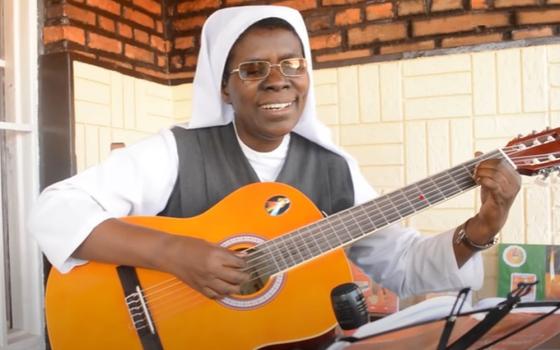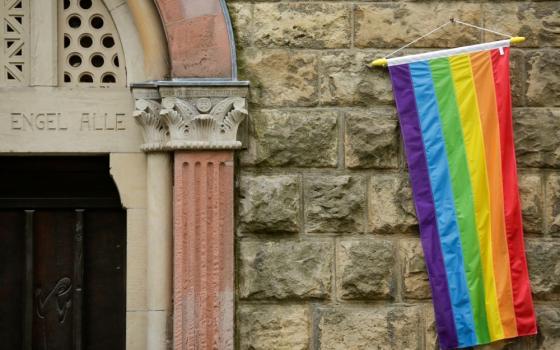The woman at the well, from this past Sunday's Gospel (John 4:5-42) is the last person on earth you'd expect Jesus to open up and reveal himself to. Not only is she a woman and an outcast, she's a Samaritan -- the hated enemy -- yet Jesus engages her in spiritual conversation, and she surprisingly takes him seriously, draws him out, and lets him teach her. He tells her what he has told no one else: that he is the holy Christ. She, not St. Paul, then becomes the first apostle to the Gentiles She must have been remarkable and no doubt can teach us a thing or two about the peacemaking Christ and the spiritual life.
We have lost the political danger of the setting. Jesus sits by the ancient well of Jacob -- in pagan territory, in Samaria, where the enemy lives, where he is absolutely not supposed to be. As usual, Jesus disregards rules, regulations, laws and borders to practice what he preaches, to loves his enemies. And he is tired and thirsty after his difficult peacemaking labors when the woman approaches him.
First, he has the audacity to ask her for a drink How could you -- the hated enemy, a Jew -- ask me -- the hated enemy, a Samaritan -- for a drink, she rightly asks. "If you knew the gift of God and who was saying this," he tells her, "you would have asked him and he would give you living water." Jesus, of course, is the real well. If we drink from the deep well of Jesus, we will never be thirsty again, the Gospel teaches. If we make Jesus the center of our lives, if we follow his way, truth and life, we will have a spring of water welling up from within us, giving us the fullness of life.
Most men in the story, from the disciples to the Pharisees, would have laughed at Jesus and walked away, but not her. She engages him about his declaration, then believes him, then demands that he give her some of this living water. "Sir, give me some of this water," she says to him.
What do we know about her? It's noon. She's by herself, far from town, not with the other women, and that's a clue. In those days, when there was no indoor plumbing, the women went to the well at 6 in the morning while it was still cool to draw water and hear the news. But this woman is by herself at high noon, which means she's an outcast. Anyone, including Jesus, would have recognized this because women would never be caught alone talking with anyone, especially the enemy.
But Jesus doesn't avoid her. He doesn't ignore her. He doesn't hate her. He has crossed into Samaria on a long desert walk of creative nonviolence to love his enemies, to offer them the good news of peace, to proclaim God's reign of universal love. What a lesson for us! Anyone who wants to follow this nonviolent Jesus needs to cross borders, reach out to those on the other side, love enemies and share living water with them. Do we Christians in the U.S. do that? No. We bombed the water purification system in Iraq in 1991, and for 17 years now, the children of Iraq have had no clean drinking water.
Jesus speaks with her about her life, tells her about herself, and explains her national history -- that her land has been occupied by five previous nations, and now is occupied by the Roman empire, with its false gods, injustice, and violence (represented in the metaphor of the five husbands). "I see you are a prophet," she says to him, as she asks him about God. They move from the practical matter of drinking water to the spiritual question of living water to the reality of political occupation and empire and finally to the worship of the living God. Throughout, Jesus calls her "Woman," showing the same dignity he used toward his mother at the miracle in Cana.
"The hour is coming when true worshippers will worship God in Spirit and truth," he tells the woman at the well. This revolutionary announcement is not made to the religious establishment, or even the disciples, but to a woman, to the enemy. God is not confined to geography or national borders, he explains to her. God is no longer just in the Temple; no longer just for the Chosen people, no longer just for the religious, but available to all people everywhere. God is found in the search for truth and through the Holy Spirit, through the living water within. And though she's not a Jew, this great woman accepts this pronouncement and takes it farther, mentioning that she knows the messiah is coming, the one who will explain everything.
Here, Jesus does something absolutely astonishing. He tells her who he is. He becomes vulnerable, opens himself up and reveals himself to her, calling himself, "I Am," the name Yahweh gave to Moses in the burning bush. "I am he, the one who is speaking to you." This is the only place in John's Gospel where Jesus says that he is the Christ. He never tells this to anyone else -- the disciples, the religious leaders, or even John the Baptist, only this hated Samaritan, an unclean woman, an outcast -- the last person he should be confessing to. Jesus is remarkable, and so is she.
I think this is what happens to us when we pray: Jesus reveals himself to us. This is what happens when we sit with Jesus in meditation: Jesus tells us who we are and who he is. This is what happens when we engage in spiritual conversation with one another: we recognize who Jesus is, our lives improve and springs of living water flow from within us. This is what happens when we worship God in spirit and in truth: we learn about the political realities of empire and occupation, and the wisdom of loving our enemies and making peace with everyone.
Just at this moment, the (male) disciples arrive and of course, they're shocked to find him talking with the enemy, with a woman. She runs off to town, (probably in response to their disapproving looks), but she's completely changed. He has removed her shame, restored her dignity, explained her life and Roman occupation, and given her living water. She tells everyone about him. She is the first missionary. The whole town listens to her, and comes rushing down the hills to meet him. And the male disciples are totally clueless. They start talking about food. Jesus is tired, hungry and thirsty; they, on the other hand, sound like they've been off eating and drinking and having a good time.
Jesus sees the entire town coming through the fields to hear him and says, "This is my food. This harvest, these people coming to me, this is what feeds me." And we're told finally that many people start to believe in him. They even start calling him "the Savior of the world," a political title reserved only for the emperor himself. These Gentiles announce that Jesus is greater than the emperor, a declaration which is nothing less than treasonous.
My only complaint with the great woman at the well, the male disciples, and ourselves is that Jesus never gets his drink of water. He remains thirsty throughout the entire Gospel. According to John, he dies on the cross saying, "I thirst." He is still waiting for us to give him water, even as he offers us his living water. He is still explaining our lives to us, still trying to tell us who he is, still hoping to reap a rich harvest of healing and peacemaking, still fulfilling his political vocation as the savior of the world, the one who calls us beyond our national borders to practice universal nonviolent love -- even as we reject him, target him, and crucify him in our enemies.
What can we learn from this story?
- That Jesus is thirsty and we need to give him water;
- That Jesus is living water and if we make Jesus the center of our lives we will have a spring of living water within us and never be thirsty again;
- That we need to practice spiritual conversation with one another and talk about God;
- That the way to worship God is to seek the truth no matter what and live in the Holy Spirit of love and peace;
- That Jesus wants to tell us who we are and to reveal himself to us as well;
- That if we want to meet Jesus, we have to look for him beyond our national borders, among our enemies whom he loves, among the people of Iraq and Afghanistan, among marginalized women and poor people, wherever we least expect him;
- That we need to love our enemies, befriend them, share our spiritual resources with them, and labor in these peacemaking efforts;
- That we too are called to be apostles, to go out and tell everyone about Jesus;
- And, that, from now on, like the woman at the well, everything has changed for us too.
John Dear's new book is "Transfiguration" (Doubleday, with a foreword by Archbishop Tutu) and he is featured in a new DVD, "The Narrow Path," (from www.sandamianofoundation.org). For information about his speaking events, see: www.johndear.org.




